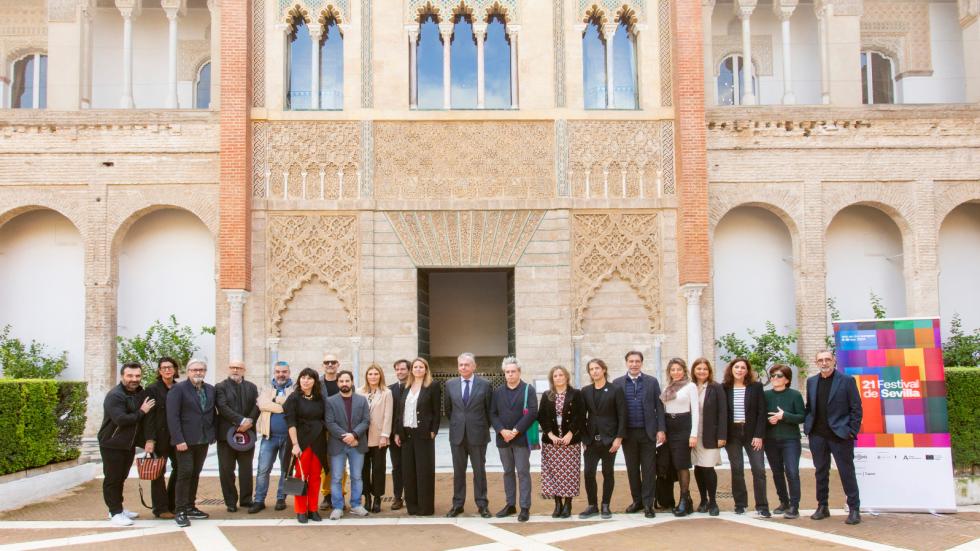
- The Seville event strengthens its position in the festival circuit and ranks first in Andalusia in terms of theater spectators.
- Nearly 300 guests and 900 accredited professionals have gathered in Seville, with notable figures amplifying the repercussions worldwide.
- 385 screenings, 168 titles, and almost 90 premieres in Spain have made the Seville Festival a prelude to the most prestigious awards and the December billboards.
- The FRAME Seville program of professional activities brought together more than 1,100 participants, including renowned producers and distributors.
The Seville Film Festival has strengthened its position as an international benchmark and epicenter of the best European cinema. This is clear from the balance of its 21st edition, which was held from November 8 to 16, and which, in the words of the mayor of Seville, José Luis Sanz, "has not only strengthened its position in the European festival circuit but has done so by putting Seville on the world cultural map. European cinema, with its variety and richness, has found in our city the perfect place to shine". An edition that closes placing the Seville Film Festival as the first in Andalusia in number of spectators in theaters, with a total of 58,015, and numerous sessions with full capacity.
During the press conference held in the Admiral's Hall of the Reales Alcázares, in which he was accompanied by the delegate of Tourism and Culture, Angie Moreno, and the director of the festival, Manuel Cristóbal, the mayor especially highlighted the notoriety of the nearly 300 guests at this edition, which according to Sanz explains "the vibrant experience we have lived thanks to the presence of great figures of cinema, such as Johnny Depp and Jeremy Irons, who have filled Seville with magic and emotion. Their participation has been a reflection of the prestige that this festival is achieving and the attractiveness of our city as a meeting place for culture," he said, alluding to some of the visits that have marked a before and after in the history of the event and amplified its impact worldwide.

Johnny Depp and Antonia Desplat. © Lolo Vasco
For his part, Manuel Cristóbal said that in his first edition as director of the European Film Festival of Seville, he has seen "enthusiasm for this new stage by the public, professionals, and press. In this sense, he highlighted the approximately 900 professionals related to the European audiovisual sector that have been accredited and have attended this meeting throughout its nine days, demonstrating that Seville is also "the place to be from the point of view of strengthening the industry." Not surprisingly, the program of professional activities of the festival, designed in collaboration with the Sevilla Film Office, has brought together more than a thousand participants.
The 21st Seville Festival has been a showcase for the most anticipated European cinema and a prelude to what is to come, in terms of awards season (Oscars, EFA...) and theatrical releases, with special emphasis on the December listings. A date in which, as pointed out in his press conference by the producer -and president of the Official Selection jury in this edition- David Puttnam, many productions aspire to obtain the visibility offered by this event, which has functioned as a platform or springboard for promising works, giving space to almost 90 premieres in Spain.
Through its ambitious programming, this edition has provided a complete vision of the continent's cinematography, bringing it closer to different audiences. Thus, beyond the total of 385 film screenings, the Seville Festival has grown and expanded in terms of venues and participation: "We have made a real leap in quality in this edition. The screenings, the selection of the jury, and the spaces in which we have enjoyed the cinema have raised the level of this festival," said the mayor, recalling that the event has had almost 180,000 spectators if we add the figures of the online and in-person audience, which has been described as "magnificent despite two days of DANA and two suspended galas."
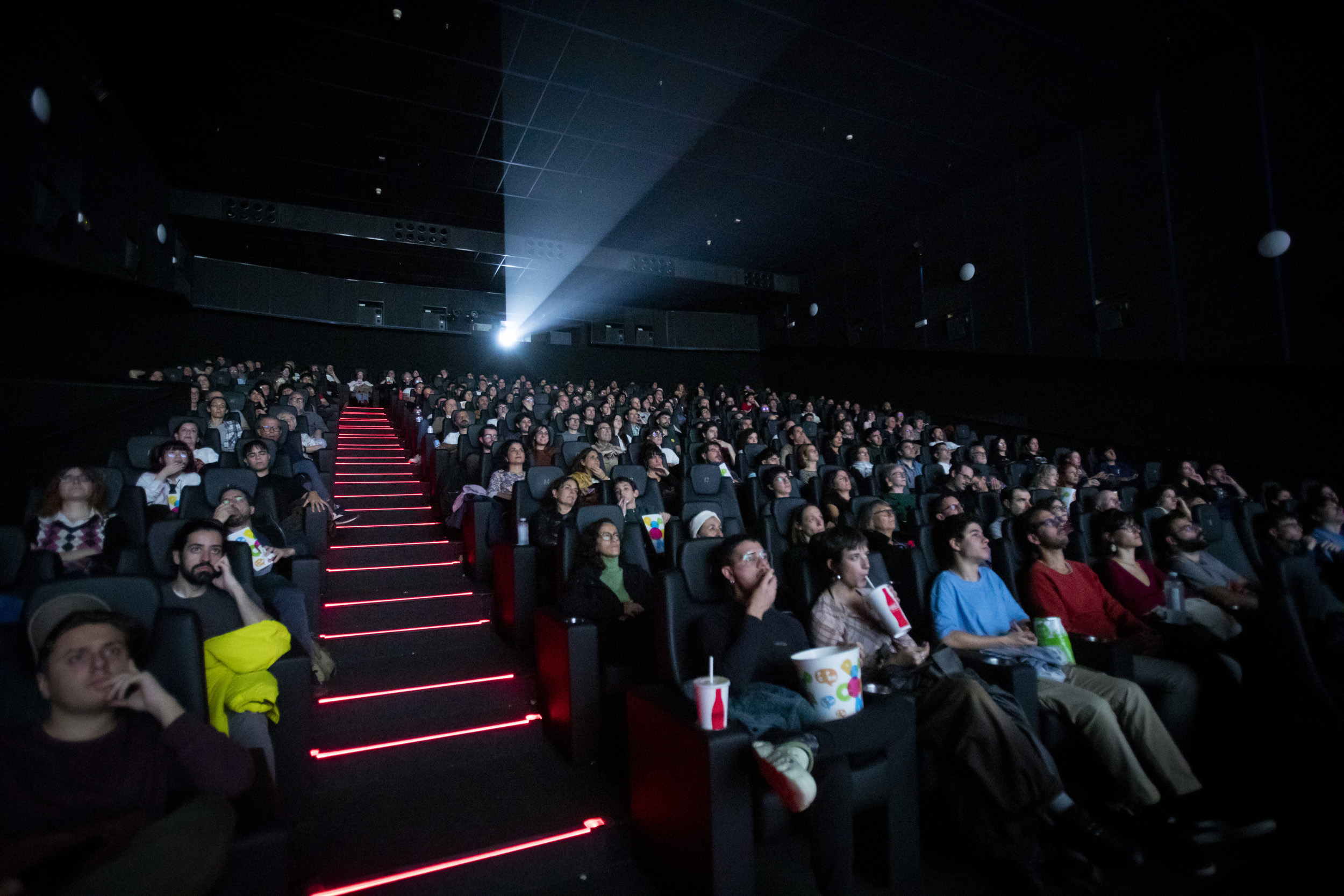
In that sense, this edition has been a definitive boost for the festival's takeoff to even higher heights and poses an encouraging future horizon, as expressed by its director: "We have laid the groundwork for further improvement and offer the best cinema to the people of Seville and the best face of Seville to visitors," concluded Manuel Cristobal.
The brilliance and worldwide impact of the festival's leading names
A total of 287 guests attended this edition of the Seville European Film Festival, of which 159 were part of the technical and creative teams of the films programmed, especially in the Official Selection and Special Events. A guest list that included numerous internationally and nationally renowned figures, including directors, actors and actresses, screenwriters and producers, who accompanied the presence of their works at the event.
On the red carpet and the various photocalls, located in multiple parts of the city, have paraded and shone with their light personalities, such as the American filmmaker Johnny Depp, who, accompanied by the French actress Antonia Desplat, came to present his new film as a director. A visit at the beginning of the festival has significantly impacted international media, social networks, and fans worldwide, placing the focus on Seville from that moment.
Other great personalities who gathered in the city during these days were the producer David Puttnam and the actor Jeremy Irons, both awarded with the Giraldillo de Honor and members of the jury of the Official Selection, along with Rome Film Fest director Paola Malanga, French programmer Eva Rekettyei, and French-Algerian filmmaker Mounia Meddour.

Jeremy Irons and Angie Moreno. © Lolo Vasco
Also in attendance as guests were renowned directors and performers of the best auteur cinema represented in the Official Selection: filmmakers Pia Marais, Lucie Prost, Ramon Zürcher, Guillaume Senez, Alexandros Avranas, Gints Zilbalodis, Margarida Cardoso, Rusudan Glurjidze and Jethro Massey; and actors Tessa Van den Broeck, Gijs Scholten van Aschat and Salome Demuria.
On the national scene, such well-known faces and talents as Albert Serra, C. Tangana, Gerardo Herrero, Benito Zambrano, Emma Suárez, Natalia de Molina, Elías León Siminiani, Álvaro Morte, Mina El Hammani, Paco León, Margarita Ledo Andión, Quim Gutiérrez, Sara Sálamo, Natalia Verbeke, Fernando Cayo, Vito Sanz, Marina Salas, Alex Béjar or Gabriel Guevara, among many others.
Overall, this year, the Seville Festival has organized 221 activities with guests, including meetings and talks, special screenings, industry activities, and press calls. Those attending the Festival's screenings had the opportunity to meet these filmmakers at the presentations of their films in the theaters and to talk with them about the different aspects of each production in the 69 colloquiums held over the course of these days.
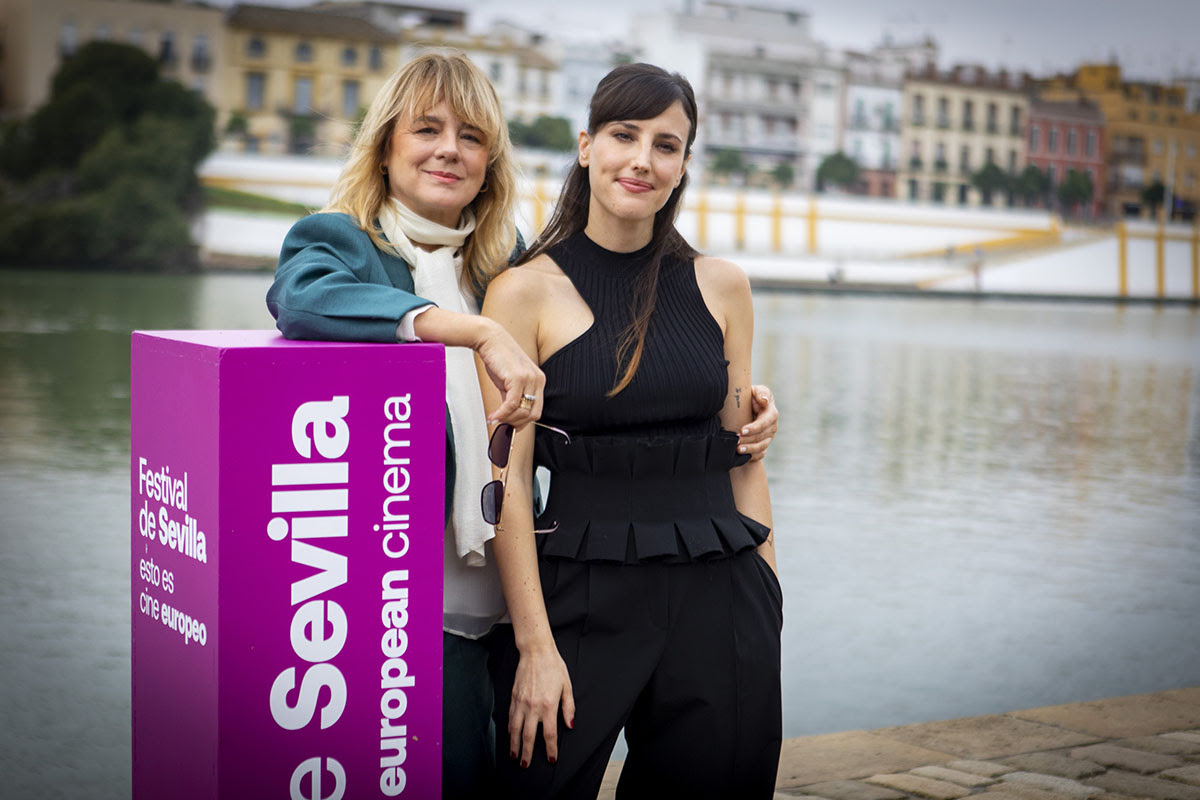
Emma Suárez and Natalia de Molina. © Lolo Vasco
Seville as a showcase and the cinematographic heart of Europe
A total of 168 titles were programmed for this year's Seville Festival, of which more than half (86) were Spanish premieres, and 21 of them were world or absolute premieres. Many of the latter correspond to films that will be released in the coming weeks, so the festival has become an event that has contributed to generating expectation and diffusion around these titles.
Among the novelties of this year's edition was the inclusion in its list of winners of the Puerta América Award for films from the different sections of the festival that represent their respective countries in the Oscar nomination for best international film, thus increasing the variety of the program and the possibility of anticipating some of the hits of the season. 16 films made up this section, among which the award winner, Flow (Latvia), which also received two awards from the Official Selection, stood out. Also shining on the list of winners were The Girl With the Needle (Denmark), Santosh (United Kingdom), and Drowning Dry (Lithuania).
Among the eight competitive sections of this edition alone, up to 21 first feature films or debuts can be counted, demonstrating the festival's commitment to the new talents of European and Spanish cinema. Official Selection films that have generated as much expectation as Desmontando un elefante, by Aitor Echeverría (AC/E Award for Best Director of a Spanish Film), or Julie Keeps Quiet, by Leonardo van Dijl (Belgian Oscar nominee), as well as several of those included in new sections, especially Rampa, aimed at recognizing emerging talent in first and second films; and also Alumbramiento, which has exhibited films without distribution in Spain, a pioneering and distinctive initiative within the festival circuit.
Likewise, among the non-competitive sections, Puerta Europa has been premiered this year, with films whose participation from the continent is a minority but fundamental, and thanks to which the variety of nationalities present has been expanded. In general, 53 countries from all over the world have been represented in this edition of the Seville Festival with their productions or co-productions, including Argentina, Australia, Brazil, Cape Verde, Canada, Qatar, United States, Philippines, India, Iran, Morocco, Mongolia, Mozambique, Palestine, Singapore, Somalia, Taiwan, Tunisia, Uruguay or Vietnam.
And from the global to the closest, the regional, an area in which it is worth mentioning the world premiere of 9 Andalusian films and series at the Seville Festival, a fact that confirms the growing interest of our filmmakers to make the release of their long-awaited works at home. Some of them have been part of the different sections, as in the cases of Un hombre libre, by Laura Hojman (Official Selection out of competition); Os naufragados, by Jorge Martín Peña (Las Nuevas Olas); El loco. Los silencios de Quintero, by José Rueda and Rocío Cañaveras, and Una perra andaluza, by Pablo Tocino (Special Screenings), to which has been added the screening of a classic like Solas, by Benito Zambrano (Esenciales), on the 25th anniversary of its premiere.
In addition, the Panorama Andaluz section has been nourished by important titles that will continue to be talked about, fiction feature films such as Rita, by Paz Vega; ¿Es el enemigo? La película de Gila, by Alexis Morante; Los últimos románticos, by David Pérez Sañudo; Padres, by José Ángel Bohollo; or Por donde pasa el silencio, by Sandra Romero; and documentaries such as Atín Aya: Retrato del silencio, by Hugo Cabezas and Alejandro Toro; Caja de resistencia, by Concha Barquero Artés and Alejandro Alvarado Jódar (Special Jury Mention at Panorama Andaluz); De caballos y guitarras, by Pedro G. Romero; Los restos del pasar, by Luis (Soto) Muñoz and Alfredo Picazo (Juan Antonio Bermúdez Award for Best Film at Panorama Andaluz), or Negro limbo, by Lorenzo Benítez.
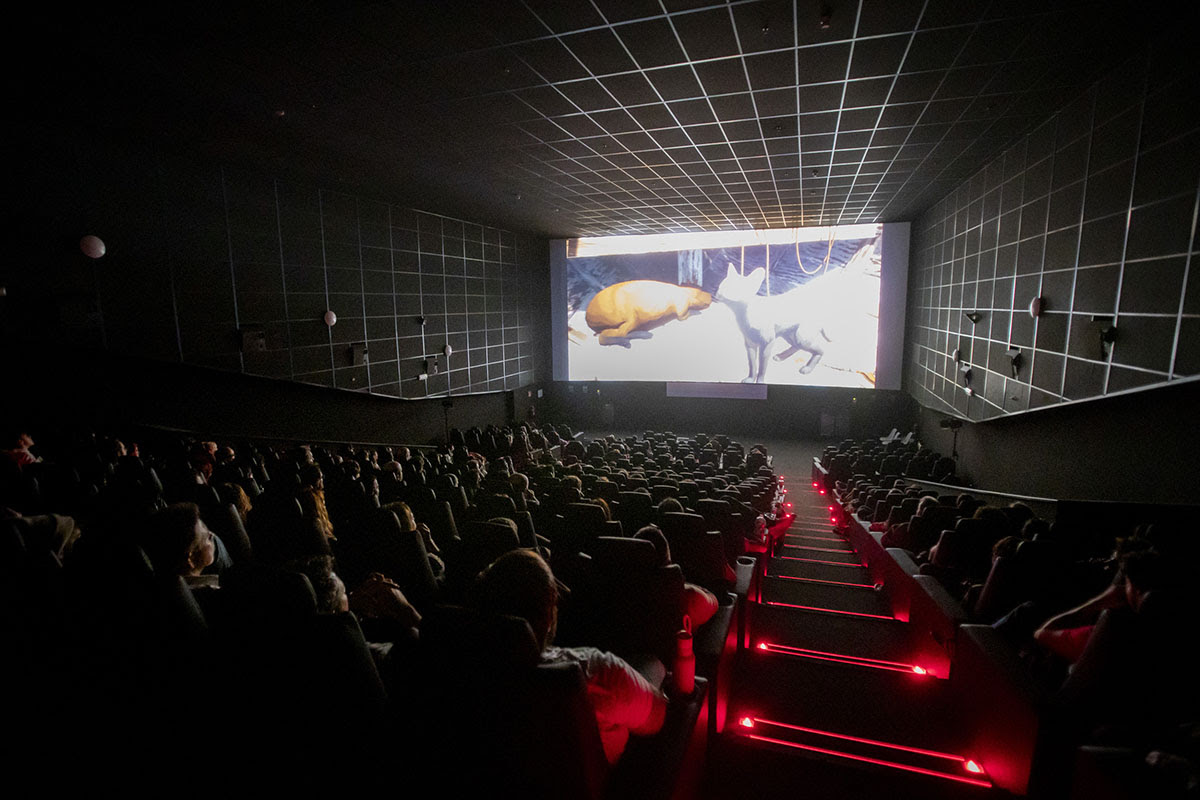
© Lolo Vasco
An exceptional setting for the industry and its professionals
FRAME Sevilla, the festival's new program of professional activities, designed in collaboration with the Sevilla Film Office, has become a benchmark meeting point for the sector, including 42 activities over its five days. More than 1,100 participants have gathered these days at the headquarters of Fundación Cajasol and Marqués de Contadero to attend a variety of sessions, presentations, and talks focused on issues such as production and distribution, financing and internationalization, as well as on specific cases and current problems.
This event, developed with the support of more than 20 collaborating entities, has brought together the most relevant professionals and experts of the international film industry to share their experience and knowledge: David Puttnam, Adolfo Blanco (A Contracorriente), José Pastor (RTVE), Luis Ferrón (La Zona), Philippe Massy (Charade), Cécile Bordas (The Festival Agency), Antonio Saura (Latido Films), Antonio Giménez Palazón (Sony Pictures Entertainment), Alexandra Lebret (European Producers Club), María Contreras (Amazon Studios), Guillermo Farré (Movistar Plus+), Mickaël Marin (Annecy Film Festival), Ignacio Pérez Dolset (Ilion Animation Studios), Juan Manuel Guimerans (Spain Film Commission) or Cristóbal García (La Terraza Films), among nearly fifty others from countries such as Spain, France, Ireland, Chile, Italy, United Kingdom and Uruguay.
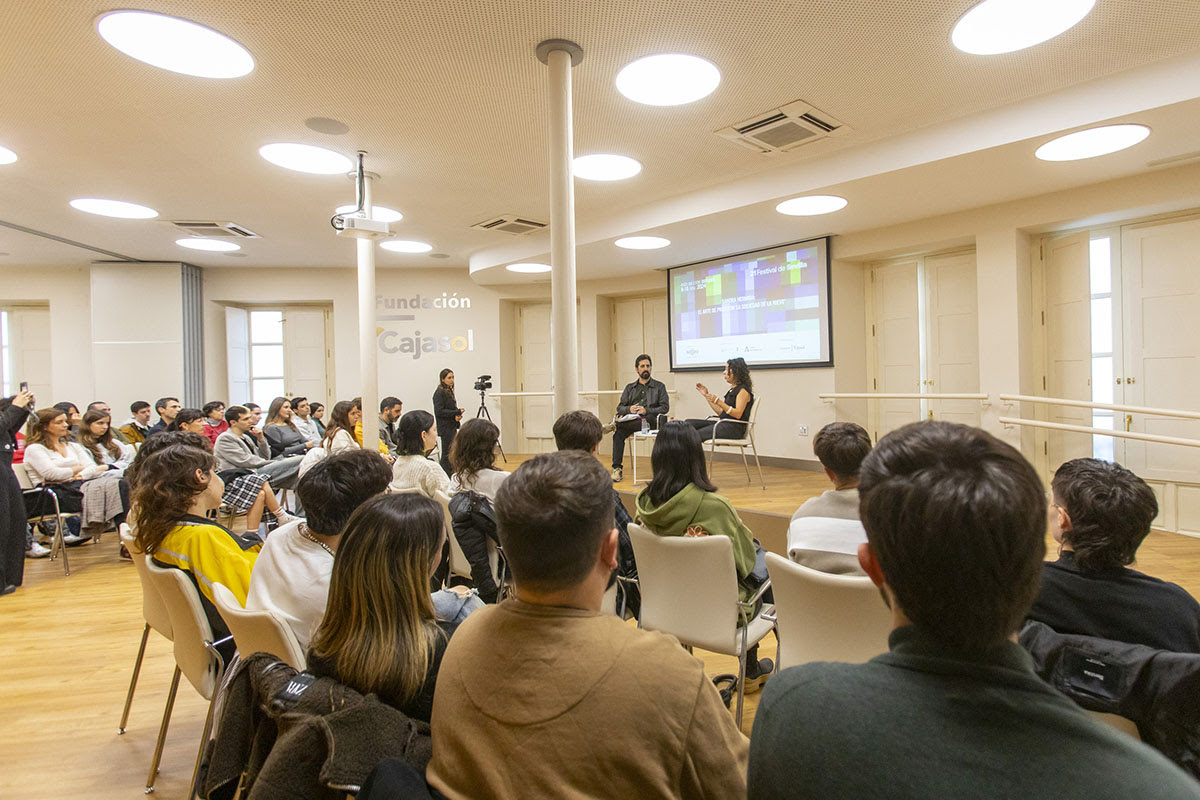
Sandra Hermida, during one of the sessions of FRAME Sevilla. © Lolo Vasco
Within this section dedicated to the audiovisual industry and the professionals of the sector, it is also worth mentioning the outstanding presence of screenwriters in this edition of the Seville Festival. Thus, and by the collaboration agreement signed with the Spanish Screenwriters' Union (ALMA), the event has fulfilled its commitment to place the figure of these professionals at the forefront of its programming and communications, laying the first stone of a relationship that aims to be strengthened in future editions, with other specific actions such as the proposal of juries in the competition sections or the organization of activities based on their experience.
Finally, the Seville Festival has also shown its commitment to the family reconciliation of the professionals attending this edition, designing a service to meet the needs of their children, ranging from babies to teenagers. In this sense, they have been offered a plan tailored to their age and preferences, adapting the attention, care, and activities to each specific case to improve the experience of these professionals at the festival and their families and to make possible their dedication in the best conditions.
In addition, the Seville Festival has programmed twenty parallel activities over eight days in this edition, with a wide variety of formats and scenarios that have extended the event throughout the city thanks to collaboration with 23 entities, attracting a total of 1,433 participants.
Alliances and collaborating entities
The Seville Festival's consolidation as a benchmark for European cinema and celebration of its upward trajectory in recognition and international participation are due, in addition to the public and the city, to the support it has received in this 21st edition from institutions and entities linked to the film and audiovisual sector, training, and cultural management.
It is worth mentioning once again the confidence of the Instituto de la Cinematografía y las Artes Visuales (ICAA) of the Ministry of Culture, which, in the resolution of its call for grants for the organization of festivals -which was announced last week- places the Seville Festival among the best rated (82.73 points).
The Seville European Film Festival is a project of the Seville City Council, funded by the ICAA and the Junta de Andalucía and supported by the Cajasol Foundation.
The following have collaborated in this edition: European Film Academy (EFA), European Film Promotion (EPP), AC/E Acción Cultural Española, European Parliament, Centro de Iniciativas Culturales de la Universidad de Sevilla (CICUS), Universidad de Sevilla, Universidad Pablo de Olavide, Universidad Loyola, IES Néstor Almendros, Instituto Superior de Estudios Lingüísticos y Traducción (ISTRAD), Fundación Tres Culturas (Junta de Andalucía), LAND Clúster Audiovisual and Digital Content Cluster of Andalusia, Andalusia Film Commission, Institut Français, Canal Sur Radio and Television, Consulate General of Portugal in Seville, Centro de Estudios Andaluces (Junta de Andalucía), Parque Científico y Tecnológico Cartuja, ECAM Escuela de Cinematografía y del Audiovisual de la Comunidad de Madrid, Consejo Audiovisual de Andalucía (Junta de Andalucía), Academia de Cine de Andalucía, AAMMA Asociación Andaluza de Mujeres de los Medios Audiovisuales, ASECAN Asociación de Escritores Cinematográficos de Andalucía, ANCINE Asociación Andaluza de Productoras Cine de Ficción, Documentary, Animation and Serial, Cartuja Center Cite, Odeón Multicines, Platea Odeón Imperdible, mk2 Cinesur, UCC Unión Cine Ciudad, NH Hotels, Hotel Alfonso XIII, Eurostars Torre Sevilla, FILMIN, Stellantis, Enrique Tomás, EGEDA Sociedad de Servicios para los Productores Audiovisuales and Royal Bliss.
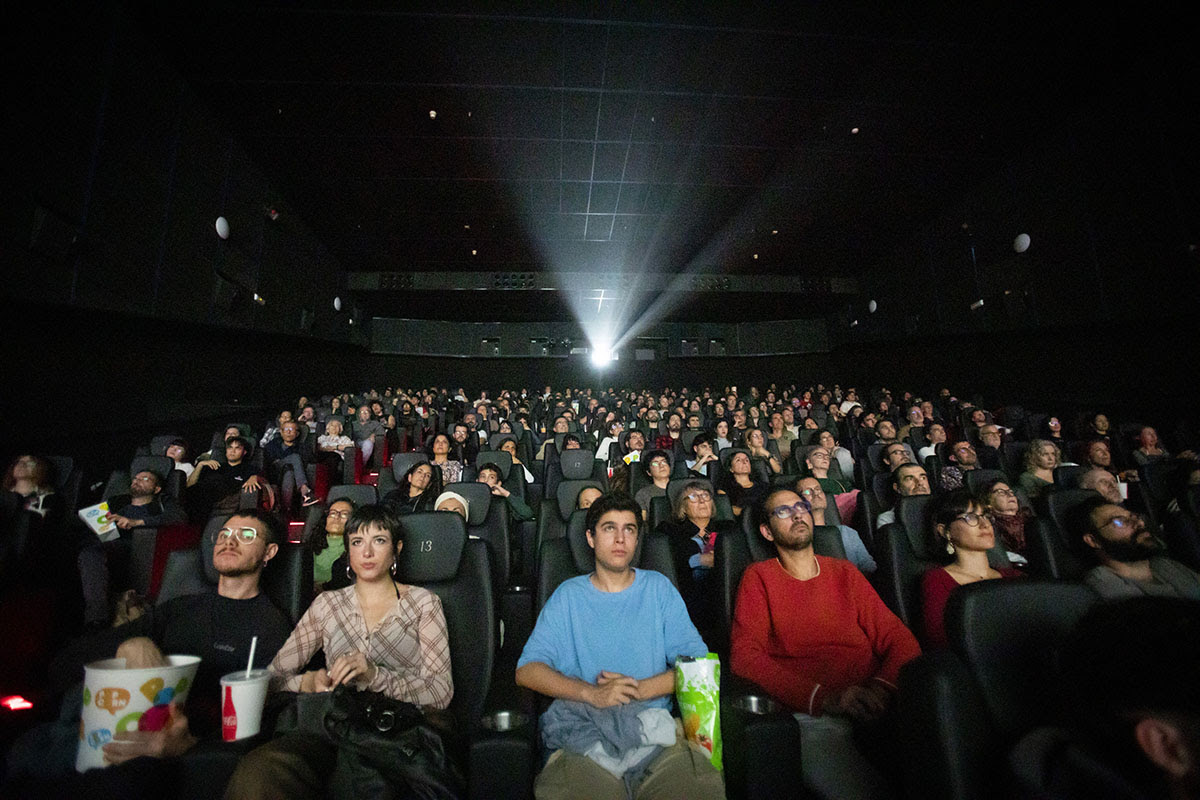
© Lolo Vasco






